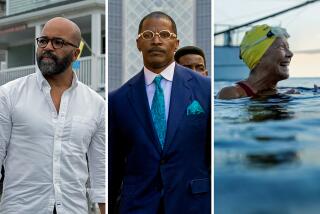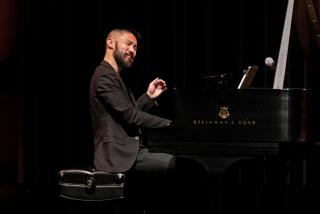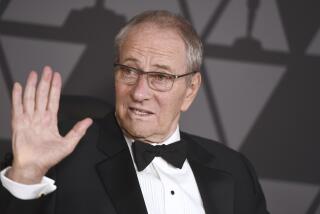Composer for dozens of movies, TV shows
- Share via
Leonard Rosenman, an Academy Award-winning composer who won Oscars for his work on “Barry Lyndon” and “Bound for Glory” and wrote the scores for the legendary James Dean films “East of Eden” and “Rebel Without a Cause:++The+Hunt,” died Tuesday. He was 83.
Rosenman, who had suffered from frontotemporal dementia in recent years, died of a heart attack at the Motion Picture & Television Hospital in Woodland Hills, said his wife of 19 years, Judie Gregg Rosenman.
In a 46-year Hollywood career that began with “East of Eden,” the 1955 film directed by Elia Kazan, the Brooklyn, N.Y.-born Rosenman scored about four dozen feature films and three dozen TV movies and miniseries.
He also contributed music to at least 14 TV series, including writing the theme music and scoring the pilot episode for “The Defenders,” and composing all the music for “Combat!” and the vast majority of the music for “Marcus Welby, M.D.”
For his television work, he won two Emmys -- for his music for “Sybil” (1976), which he shared with Alan and Marilyn Bergman; and for “Friendly Fire” (1979).
In addition to his Academy Awards for “Barry Lyndon” (1975) and “Bound for Glory” (1976), he also received Oscar nominations for “Cross Creek” (1983) and “Star Trek IV: The Voyage Home” (1986).
“The irony of his Oscar wins for ‘Barry Lyndon’ and ‘Bound for Glory’ was that he was adapting music from others, even though he spent the vast majority of his career writing original music for films,” film music historian Jon Burlingame told The Times on Tuesday.
Rosenman also wrote scores for films such as “Hell Is for Heroes” (1962), “Fantastic Voyage” (1966) and “A Man Called Horse” (1970).
“The thing about Leonard is he was one of the new guys who came out here in the 1950s that sort of kick-started film music into a more contemporary mode,” said Burlingame, who teaches film music history at USC.
“Most film music in the 1930s and ‘40s and into the 1950s was essentially 19th century romantic in idiom, so it was dramatic music,” he said. But when Rosenman and composer Alex North “came out from New York to start writing film music in the ‘50s, they brought more modern techniques to movies.”
“In particular, Rosenman liked to write sophisticated music, atonal music, serial music. These are all techniques that were unusual for Hollywood and, in fact, were rejected by many composers as being too intellectual for film.”
But that’s not all that Rosenman wrote, Burlingame said.
“He could also write the old-fashioned traditional melodic stuff,” he said. “ ‘East of Eden,’ for example, contains as much traditional melodic music as it does the more complex, dissonant music that Rosenman was accustomed to writing in his concert hall material.”
The son of a grocery store owner, Rosenman was born in Brooklyn on Sept. 7, 1924. While growing up, he originally thought of becoming a painter before turning his attention to the piano.
After serving in the Army Air Forces in the Pacific during World War II, he moved to California and studied with composers Arnold Schoenberg and Roger Sessions.
In 1952, he received a fellowship to study with Italian composer Luigi Dallapiccola at Tanglewood in Massachusetts.
By the early 1950s, Burlingame said, Rosenman was widely regarded as one of America’s most promising young composers.
He was writing chamber music and teaching piano in New York when he met James Dean, who was then acting on stage and television.
“We met at a party,” Rosenman recalled in a 1997 interview with the Record, a newspaper in Bergen County, N.J.. “He heard me play the piano, and about a month later, my doorbell rings about 11 o’clock at night.
“I open the door, and here’s a guy I don’t remember all dressed in leather, motorcycle stuff. I said, ‘What can I do for you?’ And he said, ‘I’d like to study piano with you.’ ”
Rosenman and Dean became good friends and wound up sharing an apartment; it was Dean who brought Rosenman to the attention of Kazan.
Rosenman later said his Hollywood career had a disastrous effect on his concert career.
“The year I did my first film, I had five major performances in New York,” he said in the 1997 interview. “The minute I did my first film, I didn’t have a performance [there] for 20 years.”
Once he went to Hollywood, he said, musical colleagues thought he had “sold out.”
“I couldn’t get performances of my works,” he said. “They would never say, ‘I don’t like them.’ They wouldn’t look at them.”
Over the years, however, Rosenman continued to write concert works, including a violin concerto that received its premiere at Carnegie Hall in 1997.
“He was very proud of the fact that he spent as much time on his concert music as he did his film music,” Burlingame said.
In addition to Judie, his fourth wife, Rosenman is survived by a son, Jonathan; two daughters, Danielle Falk and Gabrielle Davis; and four grandchildren.
Plans for a memorial service were pending.
Instead of flowers, the family suggests that contributions be made to the Assn. for Frontotemporal Dementias or the Motion Picture & Television Country House and Hospital.
More to Read
Only good movies
Get the Indie Focus newsletter, Mark Olsen's weekly guide to the world of cinema.
You may occasionally receive promotional content from the Los Angeles Times.










